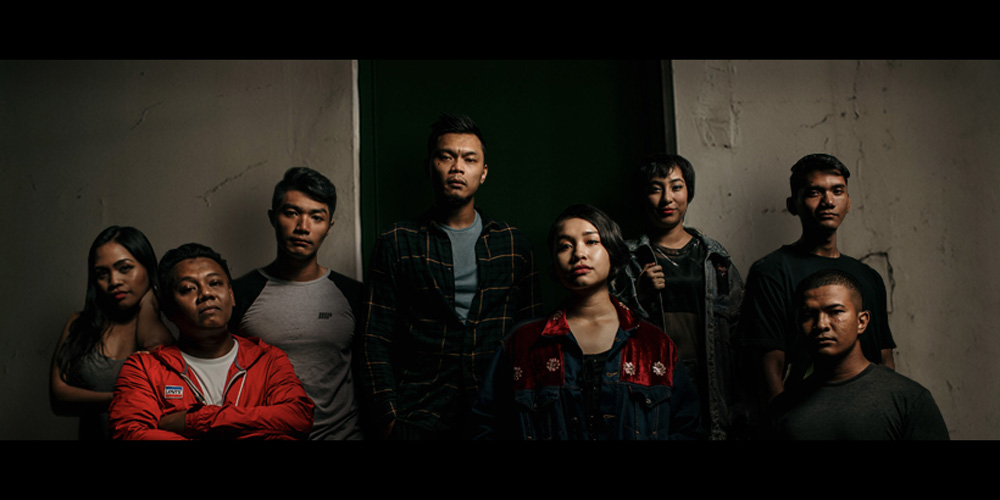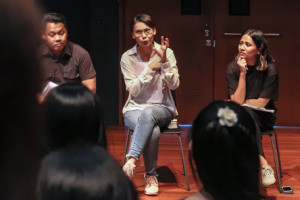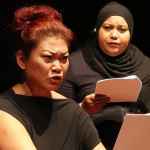
The cast of Rumah Dayak. From left: Rusydina Afiqah, Uddyn J, Yamin Yusof, Al-Matin Yatim, Farah Lola, Tysha Khan, Yamin Yusof Ali Mazrin. Photo: Rupa co.lab
In 2015, Nessa Anwar volunteered for an organisation that provided educational opportunities for underprivileged children. When she visited a rental flat on a mission trip, she was greeted by a sobering sight.
“I saw five or six curtains hanging from the ceiling inside a one-room flat. Faces kept popping out from nowhere and I realised there were more than eighteen people living in that tiny room,” she recalls vividly. “It broke my heart.”
That image stuck with Nessa, becoming both inspiration and motivation to create her latest work, Rumah Dayak, a play about a safehouse run by a pair of ex-offenders for troubled youth. The play is being developed at Centre 42’s Basement Workshop ahead of its premiere at the Malay Heritage Centre next month.
Rumah Dayak is Nessa’s second full-length work, presented by brand-new collective Rupa co.lab, which was founded by Nessa and fellow playwrights Nabilah Said and Hazwan Norly. All three are also founding members of Main Tulis Group, a Malay playwriting circle that has made Centre 42 their home base since 2016. The trio plans to take turns producing each other’s plays annually over the next three years.
Each annual production, Nessa explains, will focus on a sub-set of the Malay community. This year, Rumah Dayak shines a spotlight on the mat rep and minah rep. Often shortened to mats and minahs, the terms refer to male and female Malay youths who are trouble-makers and delinquents.

Playwright of Rumah Dayak, Nessa Anwar responding to feedback at the Guest Room reading of the work.
It’s a group she knows well having grown up alongside many mats and minahs: “They had problems with money, family and working for a living. A couple of them got into trouble with the law.”
Her volunteering stint also gave her insight into the difficulties that the troubled youths and their families faced. She says, “This play is my thought experiment on what [at-risk] kids really need – do they need tangible resources or just a space to make mistakes?”
In order to learn more, Nessa embarked on an extensive research process which involved speaking with friends, reading up on police cases, and interviewing officers from the Central Narcotics Bureau and police. As her curiosity grew, so did the material for Rumah Dayak.
Nessa finished a first draft in October 2018 and then, in June 2019, presented a test-read of the script under Centre 42’s Guest Room. There, she received a wealth of feedback on her script from theatre-artists such as Rafaat Hamzah and Najib Soiman.
“I am not an expert. I am just one voice,” she says. “But I want to make sure that Rumah Dayak is as realistic as possible.”
Her desire for veracity also extends into her direction for the work, particularly with the cast’s performance of the mat lingo.
“[When] mat reps fight, their language is coarse, but the delivery is beautiful. They use a lot of rhythm that is found in pantun [a Malay poetic form],” she explains. “This rhythm needs to be practiced. If it is not delivered properly, it will fall flat and it won’t make sense.”
Since not all of her eight cast members were familiar with the world of mats and minahs, she facilitated a two-day workshop for them to delve into the history, culture and lingo of the community.
Referencing popular reggaeton music, Nessa calls mats and minahs of the early noughties the Gasolina (2004) generation, and their present-day counterparts, the Despacito (2018) generation. The Despacito generation, in particular, has to deal with the pervasiveness of social media and higher cost of living.
“The climate of being a mat was very different. Back then, if you said you were going to run away, you would do it. Now, it’s just too expensive to run away from home,” she explains. “But there’s still that swagger [of being a mat]. It’s just translated differently and depicted differently.”
All these details are important to Nessa.
“I just want to see my friends represented on stage,” she says simply. “It is a way to pay homage to the people I grew up with.”
By Lee Shu Yu
Published on 22 October 2019
Rumah Dayak is in residence under the Basement Workshop and will be staged at the Malay Heritage Centre from 21 to 24 November 2019. Tickets available here.





